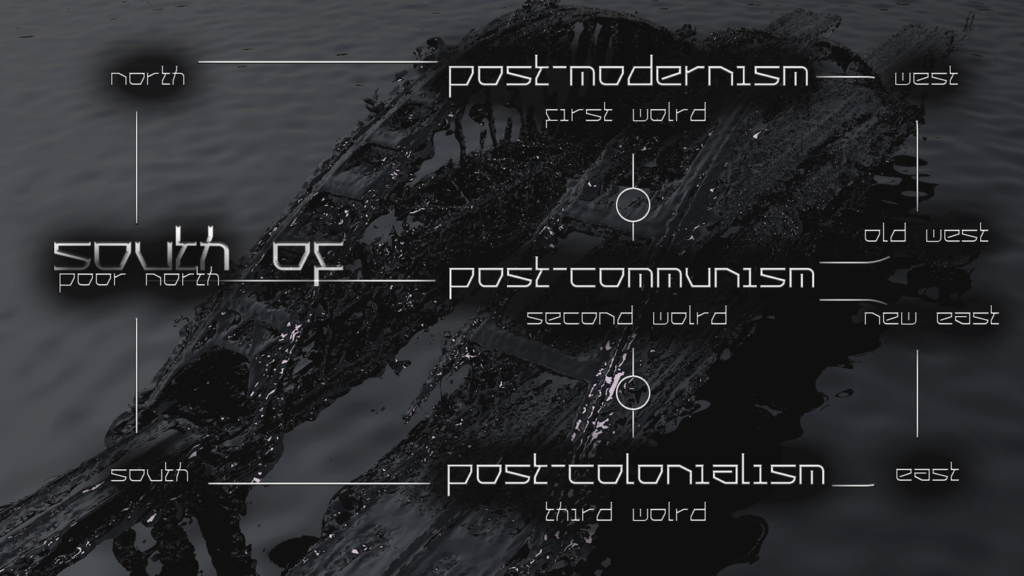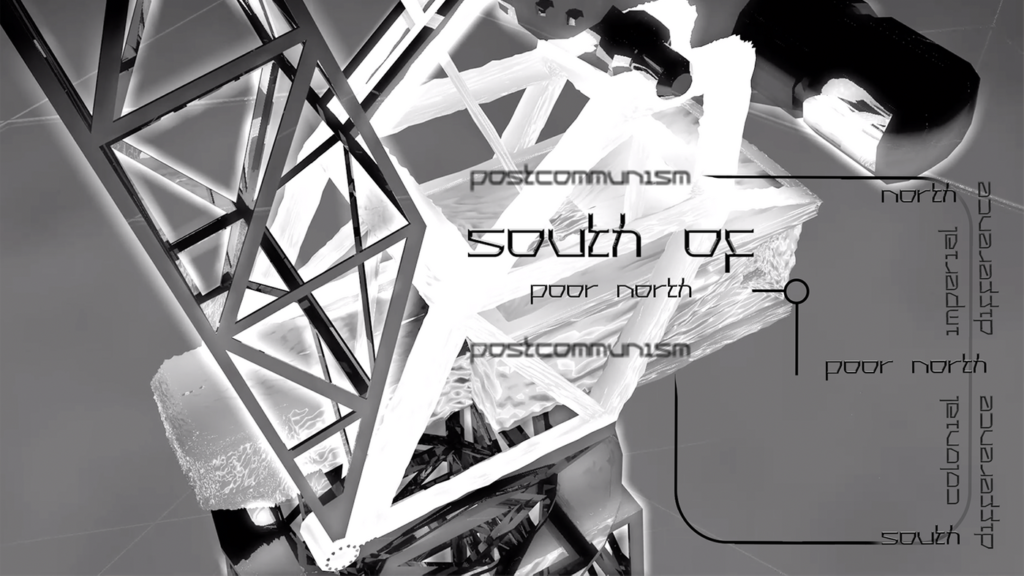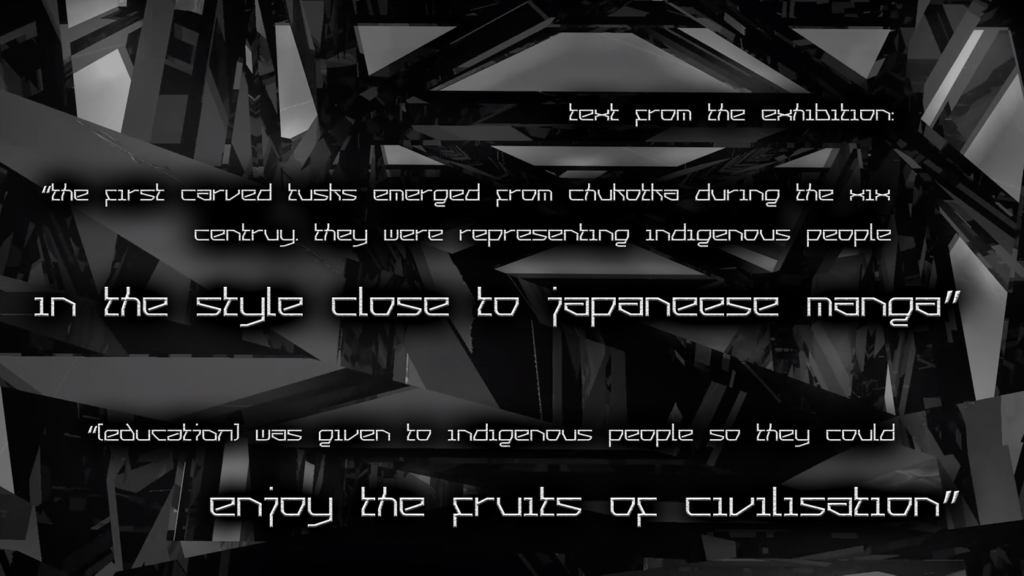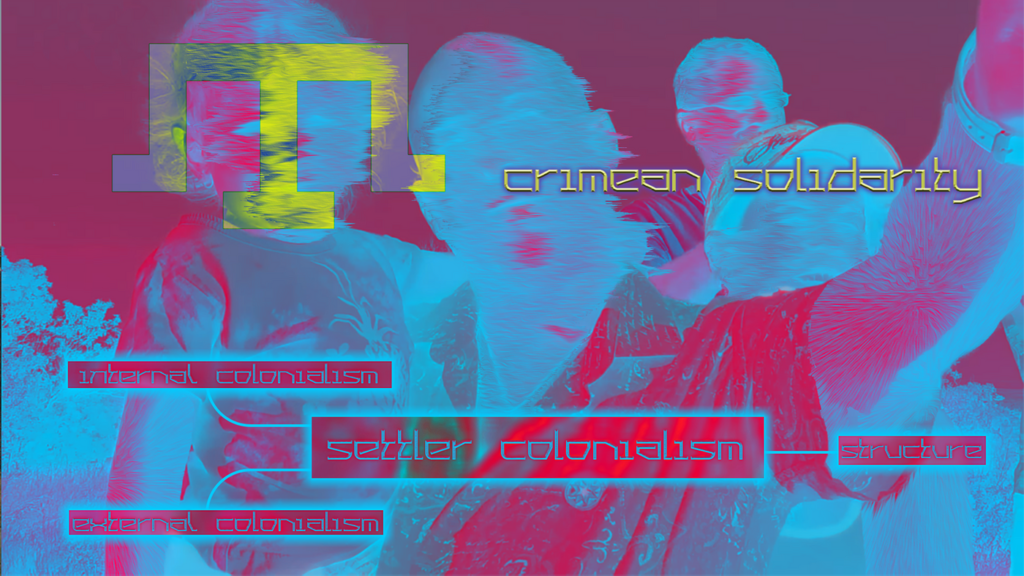THE FUTURES OF RUSSIAN DECOLONIZATION
6/24/2021

Where is the Post-Soviet in the “Post” of post-colonial?
Post-colonial theory and Russia have existed for a long time as two almost parallel universes. Even though there were researchers in the post-Soviet space who were tackling post-colonial problematics—Ihar Babkov, a post-colonial scholar from Belarus, and Oksana Zabuzhko, a Ukrainian feminist writer, to name a few—Russia was successfully rejecting the mere possibility of questioning the status quo. Marko Pavlyshyn, a rare example of the earliest attempts (1992) of a Ukrainian-Australian scholar to start the conversation, was “ignored or ridiculed by the overwhelming majority” of researchers both from Russia and the West, according to Ukrainian post-colonial scholar Vitaly Chernetsky. If post-colonial work originating in the post-Soviet space could be silenced easily, post-colonial theory coming from the West was too trendy to be totally disregarded. In his article “On Some Post-Soviet post-colonialisms” Chernetsky shows how in the 1990s Russian intellectuals conferred various euphemisms to central figures of post-colonial theory to disguise their connection to post-colonialism itself. One instance is how influential post-colonial thinkers such as Edward Said, whose book Orientalism became the foundational text for post-colonial theory, and Gayatri Chakravorty Spivak, whose “Can the Subaltern Speak?” is the opening text for any post-colonial reader, were presented in Russia. In 1998 Ilya Ilyin described them as a “well-known literary scholar of a leftist-anarchist orientation” and a “socially engaged feminist deconstructionist,” respectively. Such “strategic appropriation of post-colonial discourse,” as Chernetsky put it in 2006, hasn’t been radically questioned since then.

It is important to note at the same time that to transpose post-colonial theory on post-Soviet space is not a solution of any kind. The conversation that was started by US scholar David Chioni Moore in 2001 with the key article “Is the Post- in Post-Colonial the Post- in Post-Soviet?” made very clear the impossibility of taking any shortcuts when it comes to the topic of decolonization in post-Soviet space. Moore, Spivak, Ram, Tlostanova, and Chernetsky formulate the continuity of the argument that warns against the direct substitution of “post” in “post-Soviet” by “post” in “post-colonial.” Post-colonial theory has almost nothing to say about the Second World—it was born in the struggle of the Second World against colonization by the First World—or in new-old terms, the Global South against the Global North. Its analytical tools cannot be used as universally applicable, as they were not meant to be universal in the first place. Post-colonial studies perpetuated the exclusion of the Second World, navigating through three main “post-” subjects. Madina Tlostanova, a notable decolonial scholar from the south of Russia, describes it like this in her 2011 article “The South of the Poor North”: The “post” in “post-modernism” signifies the First World, and the “post” in “post-colonialism” the Third World. Meanwhile, the Second World is left with the “post” in “post-communism.” What might be the place of post-communism in the colonial North-South divide?
Instead of viewing the North and the South as homogeneous spaces, Tlostanova proposes a new complexity in the division. She offers the notion of differences–colonial and imperial ones.

Colonial difference substitutes the conventional division between the North and the South—an example would be the British Empire and India, which has been thoroughly reviewed by post-colonial studies and its subaltern strand as one of the most influential divisions. The imperial difference sheds light on the distinction between the roles that different empires play in colonial relations.
The imperial difference can be internal—such as the division between the North and South of Europe—and external. The external imperial difference goes between the First World and Second World empires. Russia, being part of the Second World, has always been the outsider of the First World or the “rich North,” as Tlostanova puts it. “Russia has never been seen by Western Europe as its part, remaining a racialized empire, which feels itself a colony in the presence of the West and projects its own inferiority complexes onto its colonies, particularly Muslim ones, which today have become precisely the South of the poor North,” she writes.
Tlostanova provides a fundamentally different view on the way Russian colonialism functions. In The Darker Side of Modernity, Walter Mignolo—one of the core Latin American decolonial thinkers—speaks of coloniality as the dark side of Western modernity which is inseparable from the whole. Enriched by Tlostanova’s analysis that the South produced by the poor North has no direct connection to Western modernity—versus the South of the rich North that is connected even against its own will—this thesis leads to a conclusion that the space colonized by Russia is even darker than the darker side portrayed by Mignolo.
Being considerate of imperial and colonial differences one must learn with, not from, post-colonial theory. Instead of using post-colonial theory as the only valid reference point, post-colonialism is productive as part of the more substantial project of decolonization that mindfully points towards imperial similarities. Tlostanova points out these similarities: even though the Russian/Soviet empire aimed to position itself as an independent alternative to the West’s modernization through the Bolshevik experiment, the Soviet model was inseparable from it. Therefore, a post-colonial critique of Western imperialism must be treated as a tradition on which we can act to produce our heterogenous reflections. Post-colonialism is a struggle that doesn’t have ready answers, but which might inspire how we can search for them.
One of the points from post-colonial theory that I find resonates with post-Soviet space questions the limits of the “post-Soviet” or “post-communist” itself. Arjun Appadurai, a post-colonial scholar of globalization who is of Indian origin, outlines the West’s “endless preoccupation” with itself. Chernetsky adds to Appadurai’s statement: “whether positive or negative value judgments are attached,” meaning that Western scholars tend to either praise the West or criticize it, but never speak about other geographies and contexts—so the West will always remain the center of attention. Looking at Soviet modernization and its consequences, we see a similar preoccupation.
“Many memoirs and accounts have been produced since the dissolution of the Soviet bloc, and mine wants simply to ask the question ‘where are we now, after 23 years?’” Agata Pyzik, a cultural critic from Poland, states in her 2014 book Poor but Sexy: Culture Clashes in Europe East and West. “If the Soviet Union 23 years into its existence wasn’t called post-tsarist, why are we still defined as “post-communist,” and why is it relevant? Did history take a slower pace, or was it finished, as Fukuyama said, after 1989?”
The inadequacy of such preoccupation with Soviet past becomes evident, and a valid alternative is to be proposed. The complexity of such a task is illustrated in the article “Old West and New East” by decolonial Belarusian artists Olga Sosnovskaya and Aleksei Borisionok, where they use the aforementioned quote to question the “New East”—one of the possible alternatives to “post-communism” used by the Guardian and the Calvert Journal, in line with some scholars—as an exoticizing brand.
Post-colonial and/or decolonial?
Therefore, the problem with post-colonial theory in the post-Soviet space could be narrowed down to the impossibility of using both of these terms straightforwardly. An alternative, according to Tlostanova, is lying in the space of decolonial approach, as it is “different from both post-modernity and post-coloniality.”
The difference between post-colonial and decolonial approach, Tlostanova says, lies in the abolition of the division between the subject and the object of research. Decolonial perspective doubts the possibility of speaking from the outside, meaning taking the position of the objective researcher—what Walter Mignolo criticizes as zero-point epistemology. This doubt informed the writing of this text—I am grounding its narrative in a picture that contains a white Russian man showing his family a bright colonial future. Even though the white race might be perceived as existing in a less straightforward manner in the space of the Second World, rather than in the friction of the First World/Third World division, it is in fact present with the same strength. The Caucasus, one of many examples, presents a case of imposition of such symbolic blackness in opposition to the superior white race of Russian colonizers, as outlined by Tlostanova in detail. As a simple mental exercise, if you speak Russian you can think of various racial slurs that circulate autonomously or as part of jokes — races that are not white are the most explicit targets no matter how white the color of their skin is. Furthermore, this does not imply that “conventional” white/black power hierarchy is somehow non-existent with black people facing discrimination on a day-to-day basis.

In the space of the Second World, my race is white. This picture of a white man, showing the future of Russian colonialism, aims to remind the reader of this. I speak not because I have access to the objective truth as a scientist. I cannot show the reader any future, even a decolonial one. I speak because I have a lesser risk of being targeted for the expression of views that are already well-known for the oppressed. Therefore, a decolonial approach requires one to be aware of the implicit bias I carry, along with my privileges that let me speak.
Decolonial approach questions, therefore, the very core of the current system of knowledge, also targeting its implicit rule of the West having a monopoly on formulating high theory. This Western monopoly is reproduced in post-colonial theory as it tries to extend the borders of the Western canon–introducing Deleuze, Lacan, and others to the question of race, instead of questioning their sacred status.
Decolonial approach, as formulated by Walter Mignolo, uses “delinking”—the “decolonial epistemic shift leading to other-universality, that is, to pluri-versality as a universal project” to cut a deep break. Mignolo follows Egyptian economist Samir Amin’s notion of economic delinking, which aims to create a polycentric world. Decolonial epistemic delinking is building new epistemology that actively tries to overcome the need of Western verification of knowledge.
Delinking, taken by Tlostanova, makes her conceptualization of the South of the Poor North possible, as it cannot be extended from theories oriented towards the West. Nevertheless, delinking could be a hard path to take. It could be eased with carefully chosen works from post-colonial studies, but one should be cautious of using them as a means to an end. You could use the imperial difference to reveal the colonialism of one empire with the power of another—the power of Western knowledge against the conservatism of Russian academia. It is much easier to be heard if you reference academic figures well-known in the West and make arguments that parallel already established lines of thought associated with Western knowledge production. Ironically, we can think of this tactic as similar to Spivak’s strategic essentialism—temporary networks of solidarity that appeal to the seemingly universal nature of oppression.
At the same time, the distinction between post-colonial and decolonial literature is blurred in practice more than presented by decolonial thinkers themselves. Speaking from my experience, all decolonial courses, articles, and books simultaneously mix authors that would be classified by definition as post-colonial or decolonial. Even more, new fields of studies are countering colonial violence not fitting into an ascribed division. I find it rather hard to define if Deborah Cowen, a Canadian scholar of critical logistical studies who works against colonialism in Canada, is a post-colonial or decolonial thinker.
It is important to note that the decolonial approach doesn’t present an aspired solution either. Originating in Latin America, the decolonial approach presents an inspiring but limited framework that is limited for the same reason that post-colonial framework cannot be treated as universal. One cannot homogenize post-Soviet space, as Pyzik, Borisionok, and Sosnovskaya warn us, and it could be seen that for different countries and communities forced under the post-Soviet umbrella, different lines of thought will be relevant. Space that has suffered Russian colonialism knows a multitude of concepts of race and has endured a multitude of tactics to violently enforce it. Such complexity one must find impossible to address through the replacement of one school of thought for another, of post-colonial for decolonial. As my dearest colleague Aliaksei Babets pointed out to me, Belarus might find the Afrofuturist approach to deliberately destroy history more productive to work with than the decolonial experience of Latin America exclusively.
Unluckily, decolonial approach is not free from the dichotomies it aims to abolish. On the one hand, Madina Tlostanova reproduces the Western gaze by persistently referencing only artists who would be well established in the West and creating the dichotomy between art and activism, rationalizing the former as a more inventive mode for resistance while ignoring the latter. On the other, the notion of decolonial can be appropriated by Russian colonialism as easily as the notion of post-colonial. The year 2019 in Russia was marked by a heavy metaphorization, meaning appropriation of decolonizing discourse. Starting with the research school “Decolonizing Imagination,” various institutions were ready to decolonize everything–theaters, museums, etc.—without any decolonization of colonial relations themselves, as was explained by Russian cultural theorist Daria Iuriichuk. One of the only examples of grounded attempts of decolonization has been the independent online journal KRAPIVA which aimed to create new grounded decolonial reflections.
This process was anticipated by Sasha Alekseeva in her lecture “Decolonization is not a Metaphor,” in which she used as an entry point the article of the same name written by US non-white decolonial researchers Eve Tuck, who is Unangax (Aleut), and her frequent collaborator Wayne Yang. Tuck and Yang described the process of the easy adoption of decolonizing discourse which is extensively happening in the West. It manifests in numerous calls to decolonize everything without answering what colonialism is and how decolonization is different from other social justice projects. They demand that the question “what is colonization?” must be answered specifically, with attention to the colonial apparatus that is assembled to order the relationships between particular peoples, lands, the “natural world,” and “civilization.” One must be careful against making colonialism an empty signifier that could be fulfilled by any form of oppression, losing as a consequence the radical potential of decolonization.
Tuck and Yang outlined the list of “settler moves to innocence” that one could witness happening throughout 2019 in Russia. They define “settler moves to innocence” as attempts to lift guilt and responsibility without giving up power and privilege. It could be described as mental gymnastics that allow talking about decolonization in a way that would explain why white people are not to blame for the system of oppression that profits them. One of such moves to innocence is “colonial equivocation”—the homogenization “of various experiences of oppression as colonization.” In this way various groups are being described as “colonized” without any grounded description of their relation to colonialism. In this logic everyone is colonized, which is a way to say “none of us are settlers.” This move to innocence is apparent in various cultural events overviewed by Iuriichuk, in which it was never apparent who were the settlers and various colonial relations were mixed together to prove that everyone is colonized.

Such metaphorization of decolonization and moves to innocence resemble the processes that were already happening with post-colonial theory in Russia before decoloniality became so well-known. These processes are the exact ones I’ve mentioned earlier as strategic appropriation of post-colonial discourse. They constitute an important tendency in the Russian contemporary art scene when stated intentions are to critically analyze colonial past, but the realized project advocates for the opposite message. One of the examples of this trend comes from 2017, when Garage Museum of Contemporary Art made an exhibition Chukotka: Art of the Northern Colony, which accompanied a big show of Congolese art as a reflection on Russian post-colonial context. Instead of the creation of a place where epistemology could be decolonized (either through delinking, inclusion of the present, etc.), the exposition actively perpetuated a wide range of colonial practices. These practices included the objectification of natives, reduction of their culture to simple stereotypes, further othering, exotization, and advocating for coloniality. Visitors had no means to escape the position of the colonizer, and were left with only one choice—to see with a colonial gaze. That implicit coloniality created an absurd situation of the “second” colonization of Chukotka by Garage Museum.
Such strategic appropriation is not a phenomenon limited to the art world; it haunts academia as well. Russian academics might engage with post-colonial theory to perpetuate Russian colonialist ideology, as in the case of Russian post-colonial scholar Aleksander Etkind. He was criticized extensively for “historical Soviet nostalgia” by Ukrainian scholar Sergei Zhuk in 2014 and advocacy for Russian colonialism by Chernetsky in 2006 and 2007. Yet, Etkind still somehow holds the strategic position of an expert on post-colonial theory in Russia, following the exact pattern outlined by Chernetsky of staking a “disciplinary authority” by “strategic appropriation of post-colonialist discourse.” These examples make evident that post-colonial turn in Russia itself hasn’t happened yet, no matter how many exhibitions, public talks, and seminars were held.
Disentangling colonialisms
It seems vital at this point to provide a grounded analysis of Russian colonialism, one that would avoid homogenization and equivocation. Russian colonialism could be characterized as settler colonialism, as it combines the features of external and internal colonization, erasing the spatial separation between metropole and colony. Russian colonialism features military colonialism — a sign of external colonialism — with “biopolitical and geopolitical management of people, land, flora and fauna within the ‘domestic’ borders of the imperial nation” of internal colonization (Tuck and Yang, 2012). This could be witnessed in the case of the Crimean annexation, which cannot be reduced to one event but is performed as the continuous discrimination of Сrimean indigenous people. Forcing out pro-Ukrainian groups and actively imprisoning Crimean Tatars, Russia at the same time is sending more police officers and Russian patriots in Crimea, showing direct governmental influence on the demographics of the Peninsula.
“Settler colonialism is a structure and not an event,” Tuck and Yang warn us. Investigation of the event, therefore, should treat annexation as a manifestation of the broader structure of Russian settler colonialism. Without this lens, it is impossible to think of the available means to bring this structure to an end and ways to intervene in the ongoing event of annexation. Investigation of the event itself can undoubtedly fuel the resistance but doesn’t help with the elaboration of means of resistance that are available for different groups inside and outside the peninsula. According to Australian philosopher Paul Patton, we need decoloniality “to ‘problematize’ existing solutions in order to arrive at new ones.” Speaking with the terms of Deleuze, annexation is an “empirical event” that is a part of a “problem event.” The empirical event (annexation) is the manifestation of the structure that the problem-event constitutes (colonialism). Therefore, a problem-event is never exhausted by an empirical event, which leads us to the conclusion that we must address the structure of colonialism in line with the particularities of its manifestation. In the case of the Crimean annexation, it might be the infrastructure that mirrors the logics of the problem-event rather than the empirical event of the Russian military appearing on the peninsula in 2014.

Analyzing colonialism, I propose therefore to aim for its infrastructure, both of domination and resistance to it, following Indian post-colonial feminist researcher Chandra Talpade Mohanty. This infrastructure of domination might be revealed through looking into logistical networks of the empires as they, according to Deborah Cowen, map the logic of contemporary imperialism in spatial materialization. As I show in my recent project “Adversarial Infrastructure”, analysis of spatial dimensions of colonial infrastructure reveals otherwise hidden colonial logics. Adversarial Infrastructure maps different dimensions of the Crimean Bridge to show how it enhances Russian colonial presence in the area and reveals the geography of the project that exceeds the material bridge. Such a material approach to colonialism outlines the counterintuitive collaboration between the Russian state and Western companies, as they were actively participating in the construction of the bridge. Such evident connection between the Western and Russian colonialisms breaks with colonial equivocation, outlined above. Instead of appealing to the formula “we are all colonized by the West” it shows how such Western colonial influence rather enhances one of Russia, showing how colonial violence against racialized subjects is being multiplied in its materiality.

This approach was taken further in another project that was launched with my colleague Sasha Shestakova—the web platform “Intermodal Terminal”. This platform creates a space of pluritopic hermeneutics to further the analysis of post-Soviet colonial logistics. According to Tlostanova, pluritopic hermeneutics creatively questions the way the object of the research is supposed to be studied “by various disciplines with the help of their respective instruments” in monotopic hermeneutics. Pluritopic hermeneutics is proposed to be a playground for various knowledges to interact with each other. Through such interaction the notion of knowledge as such and its necessity would be revisited “to make the world a better place for everyone” (Tlostanova, 2015). Such interaction implies a dialogue not only between post-colonial and decolonial, but also between scholars, activists, and artists. “Intermodal Terminal,” facilitating such dialogue, leaves open the question of how Sasha and I see our space in decolonial resistance. We, as white settlers, have access to epistemologies, meaning high theory, and places, meaning art-galleries and cultural institutions in Russian and Western metropolies. In these epistemologies and places non-white people are rarely given space to talk for themselves due to issues like islamophobia, problems with working visa, and overall high threshold in privilege status and weight of discrimination. Therefore, we try to use our privilege to create alternative infrastructures that facilitate the knowledge that is being actively silenced in such spaces, maintaining the inevitable friction of white guilt not to occupy the space ourselves.
Nevertheless, it is important to remember that alternative decolonial infrastructures already proliferate outside of spaces that engage with high theory, in on-the-ground grassroots activism. One of the most inspiring examples of the infrastructure of decolonial resistance is the civic initiative “Crimean Solidarity”. This organization, led by Crimean Tatars, aims to support people who have been discriminated against by the Russian state in Crimea. Crimean Solidarity constitutes the network of lawyers, journalists, and activists that provide help to those who face political charges and their families. Furthermore, they document and archive the new dark era in the history of Crimean Tatars, preserving the history of the oppression and resistance for upcoming generations. Crimean Solidarity and similar initiatives are actively creating decolonial futures and decolonial pasts that we must support and learn from.
These decolonial futures are already here, and they will not be pointed to by beneficiaries of colonialism.
The article was originally published in Strelka Mag and updated for the STATUS online platform.